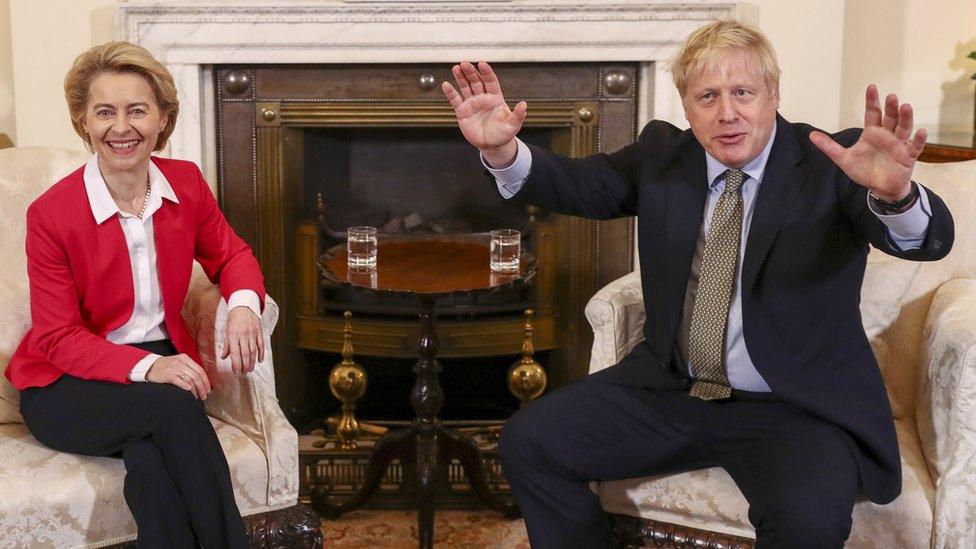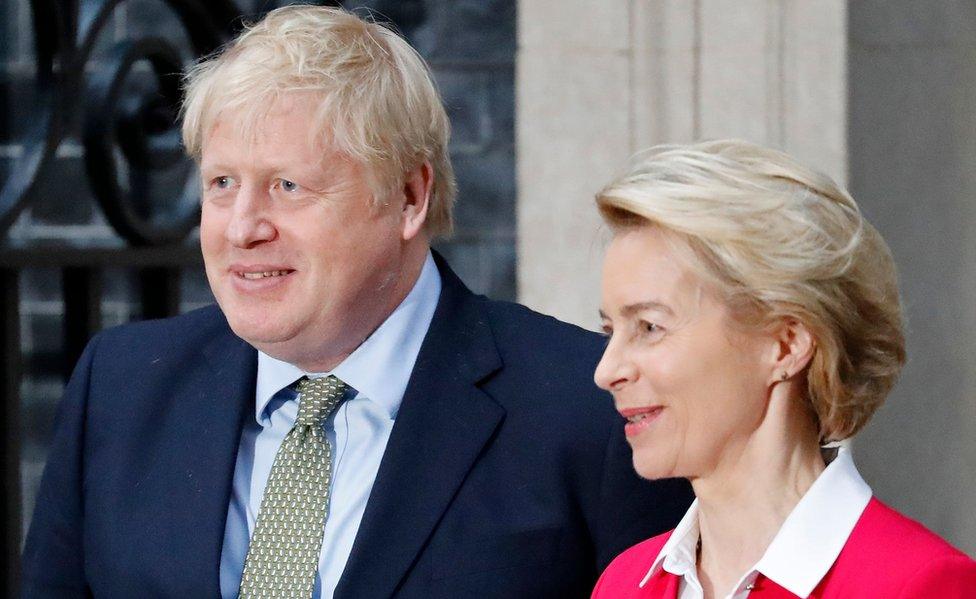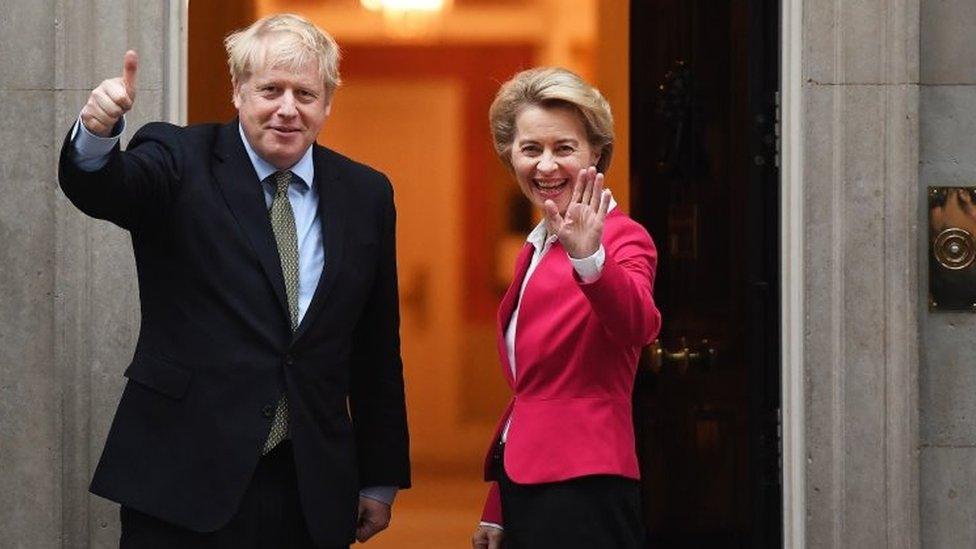Why Brexit Stage Two may turn into a rocky ride
- Published

Mrs von der Leyen said negotiating all aspects of the UK's future relationship with the EU by the end of 2020 would be "basically impossible"
"Only as true friends can, I want to be very honest about what lies ahead of us." The words of the new European Commission president as she headed to Downing Street and her first face-to-face meeting with Boris Johnson on Wednesday.
What lies ahead of the EU and UK might, on the surface, appear relatively straightforward.
By the end of this month, both the European and the UK parliaments will have ratified a negotiated divorce deal. As of 1 February, the UK will no longer be an EU member and by the year's end, says Boris Johnson, an ambitious new trade deal will have been negotiated and signed off by both sides.
So is he right?
Will this be a year of bilateral plain sailing?
With Mr Johnson's considerable parliamentary majority, nothing stands in the way of Brexit taking place. 31 January will be a huge moment. For the UK and the EU. For very different reasons.

Losing a member state, especially such a big, wealthy and important one (one of the only two military powers in Europe and with a seat on the UN Security Council) is a tremendous blow for the bloc, however strong post-Brexit relations with the UK may or may not turn out to be.
By imposing a December deadline for post-Brexit trade talks with the EU, the prime minister has succeeded in focusing European minds. But they have not been persuaded to "do whatever it takes" to agree a trade deal, despite the UK being their most important neighbour.
Commission President von der Leyen was lavish in her praise of the UK in a speech on Wednesday morning.
EU chief Ursula von der Leyen says the UK and the EU will remain "best of friends and partners"
She spoke in admiring tones of the UK's contribution to the European project in the past, and of her hope and conviction that bilateral ties would remain broad and strong in the future.
But half-buried in the avalanche of studied positivity were clear words of warning. "With every choice comes a consequence," said Mrs von der Leyen, external.
By leaving the EU the UK will be rid of the "onus", as perceived by many British voters, of the freedom of movement of European workers. But by the same token, the Commission President pointed out, the UK would no longer benefit economically from the free movement of capital, goods and services in the world's largest single market.
There will be no compromise on the integrity of that market, she insisted - as all EU leaders have insisted since the Brexit vote back in 2016.
Why fishing will be a tricky issue
Mrs von der Leyen went on to warn that Boris Johnson's timetable for trade talks was too short to agree new post-Brexit relations on every subject. So, she said, some areas would have to be prioritised.

The whisper in Brussels is that EU leaders will use Boris Johnson's tight schedule to prioritise bilateral relations of importance to them. Ongoing access for EU fishermen to UK waters, for example. A key concern for eight EU countries, including influential France.
Just this week, French President Emmanuel Macron called on lead EU negotiator Michel Barnier to be tough, even cold-blooded, in talks.
Fishing is a political hot potato for the prime minister. "Sovereignty over our seas" became a totemic Brexit issue, although it contributes little to UK GDP. But Mr Johnson will also be aware if he refuses the EU access to UK waters after Brexit, the EU will threaten to close its market to UK fish.
But surely the EU too is aware that it must think outside the box when it comes to post-Brexit talks with the UK?

The two leaders agreed that co-operation on the global stage would be invaluable on climate change, security and human rights
The relationship is hugely important in terms of trade potential, security co-operation and relations on the world stage. Take the current Iran crisis as an example.
This, of course, is true. But it's not yet clear how flexible the EU will be. Brussels believes it holds most of the cards in negotiations.
What will be the price of a Johnson 'victory'?
Even the early EU concession that some kind of Free Trade Agreement can probably be reached by December - and that, in the words of President von der Leyen, the bloc "will go as far as it can go" - is a mixed blessing for the UK.
The EU assumption is that, come the year's end, Prime Minister Johnson will want to demonstrate that He Did It.
He took the UK out of the EU. He negotiated an FTA quicker than anyone thought possible.
But will he seek that "victory" at any price? Even if the rushed result is flimsy, restrictive and involves key concessions by the UK?
Barclay: 'Let's be positive' about 2020 Brexit trade deal deadline
The price Boris Johnson paid for getting rid of the infamous backstop in the divorce deal was high. In practical terms, when it comes to trade, it separates Northern Ireland from the rest of Great Britain. Something he, the leader of a unionist political party, said he would never do.
The implementation of that Northern Ireland agreement still has to be hammered out this year in parallel to trade talks, by the way. How many checks, how much additional paperwork will there be in trade between Great Britain and Northern Ireland? What about checks between Northern Ireland and Great Britain?
And even when it comes to the zero-tariffs, zero-quotas, post-Brexit trade deal the prime minister speaks about so often, the EU insists that to get it the UK must sign up to ongoing alignment with EU rules, like environmental and labour regulations.
But Mr Johnson seeks the opposite. He says he wants to leave the EU to be free of its rules, in order to ease trade deals with others, like the United States.
What about a deal on services?
Yet the prime minister will know, if he refuses alignment with the EU, and the EU slaps on punitive tariffs, that could hurt his new supporters in manufacturing communities in the north of England. The UK car industry, chemicals industry, pharmaceutical industry and others are very worried indeed.
It's no surprise really that the EU has declared itself willing to do a "quick and dirty" trade deal in goods. It has a trade surplus with the UK.
What is surprising is that the prime minister has barely mentioned services during the last months even though they make up 80% of the UK economy.
The EU is the UK's biggest customer for the service industry and Brussels does not intend to discuss most services before December.
A scaled-down deal may or may not be finalised in 2020.
A fudge may or may not be agreed between the two sides as to how to keep talking into next year.
Only one thing is certain. Brexit Stage Two: The Trade Deal - much like its prequel, Brexit Stage One: The Divorce - will be very far from plain sailing.
- Published8 January 2020

